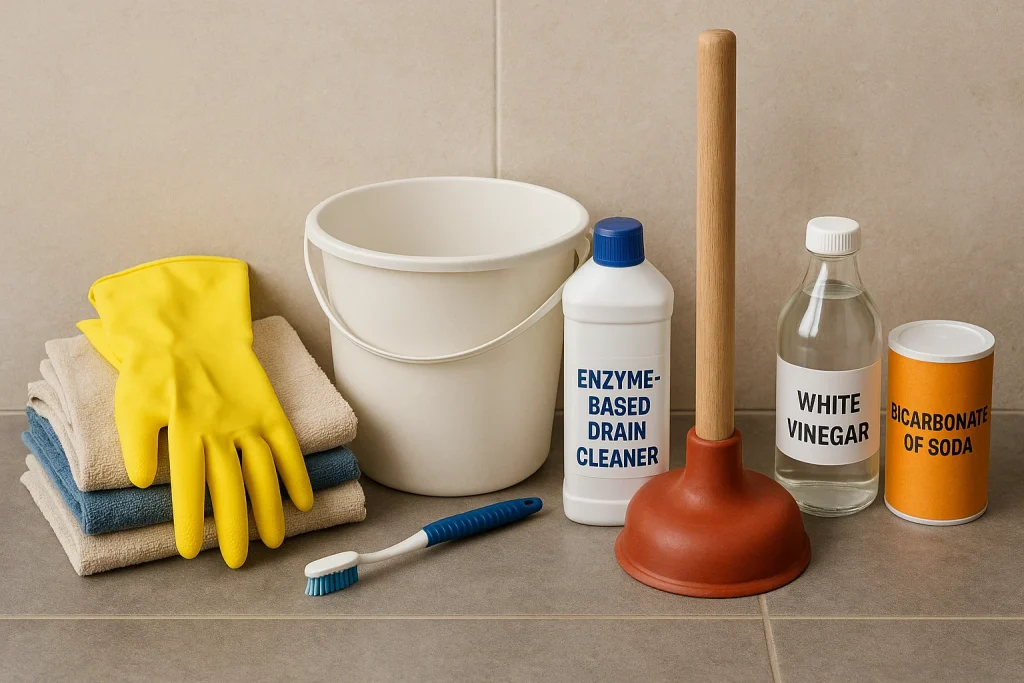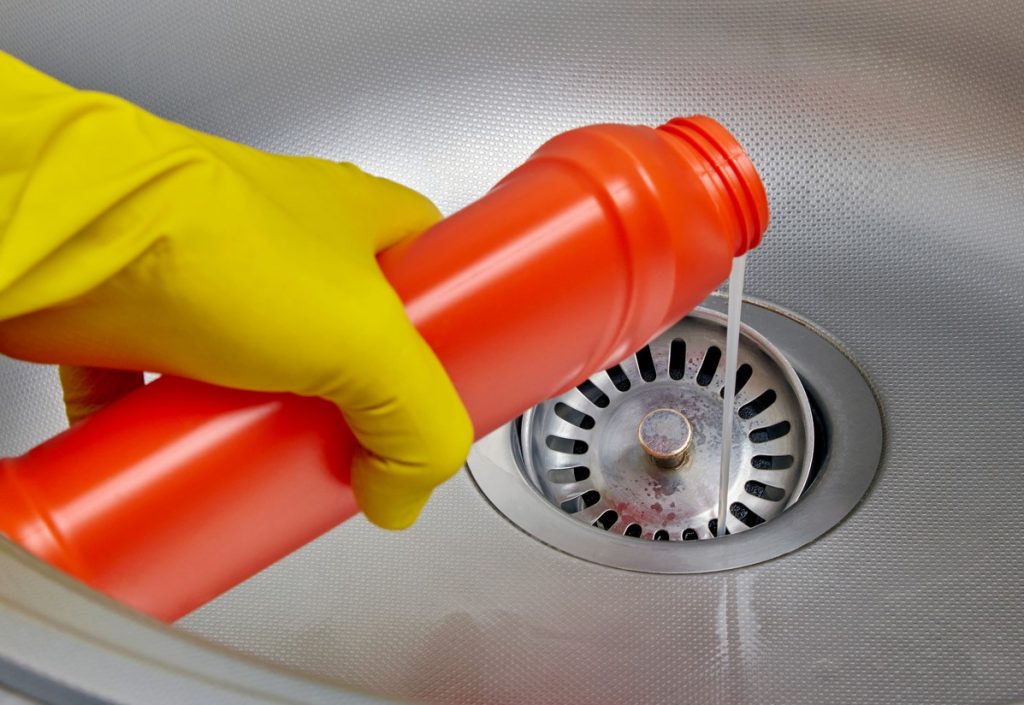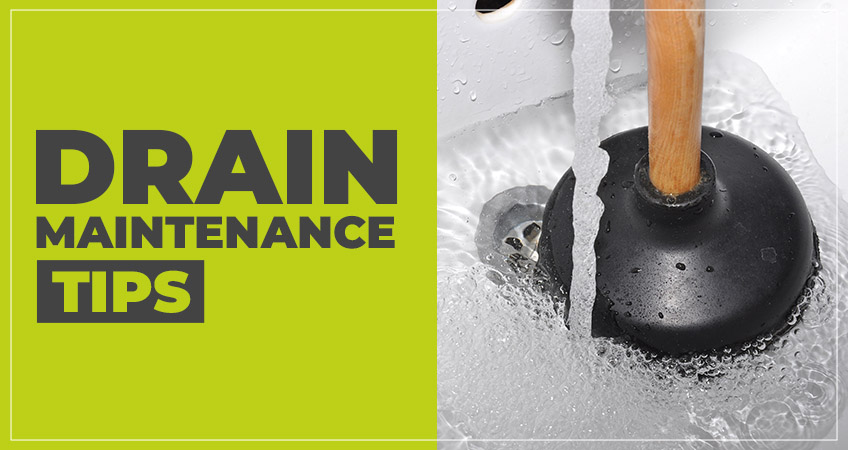Properly maintaining your home drains is crucial for a clean and healthy living environment.
Neglecting this essential task can lead to blocked drains, unpleasant odours, and even expensive plumbing repairs.
In this article, we’ll provide you with 10 unique and expert tips to help you clean and maintain your home drains like a pro as well as a step-by-step guide to giving them a thorough clean.
So, let’s dive in!
Tools and items required
Before we delve into the nitty-gritty, you’ll want to ensure you’re suitably equipped for the task.
Some essential tools for drain cleaning and maintenance are:

- Plunger
- Enzyme-based drain cleaner
- Protective elbow-length rubber gloves
- Bucket
- Old towels or cloths
- A stiff brush or toothbrush (an old one, you won’t be scrubbing your molars with it afterwards!)
- White vinegar
- Bicarbonate of soda
Tip 1:
Adopt a preventative mindset
As the old saying goes “prevention is better than cure” and so the best way to keep your drains clean is by preventing clogs in the first place. Use drain covers or strainers to catch debris such as hair, food particles, and soap scum before they enter the drains. Regularly clean these covers to ensure they function effectively.
Tip 2:
Say “no” to chemical drain cleaners
Avoid using harsh chemical drain cleaners as they can damage your pipes over time. Instead, opt for natural alternatives like a mixture of baking soda and vinegar. Pour the baking soda down the drain, followed by vinegar, and let the fizzing action work its magic. Finish by flushing with hot water. Speaking of which…
Tip 3:
Hot water flush your drains regularly
Once a week, flush drains with hot water. Boil a kettle of water and slowly pour it down each drain to dissolve any accumulated grease and flush away minor buildups. This simple step can prevent clogs and maintain the smooth flow of water.
Tip 4:
Enlist the power of enzyme cleaners
Enzymatic drain cleaners are a plumber’s secret weapon. They contain bacteria and enzymes that break down organic matter, eliminating smelly drains and preventing clogs. Use these cleaners monthly to keep your drains clean and free from foul odours.
Tip 5:
Your sink should not be an extension of your bin
Take care of your kitchen sink by being mindful of what goes down the drain. Avoid letting grease, oil, coffee grounds, eggshells and fibrous materials (such as potato peels and corn husks) go down the sink. Dispose of them properly in the food waste bin or compost bin if suitable. Being cautious with your kitchen sink can prevent blockages and maintain smooth drainage. Read our blog for more details.
Tip 6:
Brush your hair before you wash it
As satisfying as it may be to watch clumps of hair fly down the drain, this is a surefire way to cause a nasty clog in your shower drains. Always brush your hair before washing it and dispose of it in the bin NOT down the toilet.
Tip 7:
Regularly clean bathroom drains
Just because it’s your papaya and passionfruit shower gel that’s going down them rather than food scraps and tomato ketchup, that doesn’t mean that bathroom drains can’t also get blocked and kick up a stink. You may not see it but, skin particles, hair and oils from your body are flushed down your bathroom drains; all of which can accumulate over time.
Prevent bathroom drain clogs by cleaning them regularly. Remove the drain covers and use a long, flexible brush to dislodge hair and debris that may have accumulated. Rinse thoroughly with hot water to wash away any remaining residue.
Tip 8:
Don’t ignore monthly maintenance
Once a month, perform a deep cleaning of your drains using boiling water and vinegar. To do this, simply pour a pot of boiling water down the drain, followed by half a cup of vinegar. Let it sit for 10 minutes, then flush with hot water. This will help remove accumulated gunk and maintain optimal drain health. Still problem persist, then call us for your help.
Tip 9:
Don’t wash pets in the bath
We know, it’s cute to see your four-legged companion splashing about in the bathtub but this can cause serious clogs. Fur and dirt, along with all kinds of muck that your pet may have found on their adventures, will inevitably be washed down the drain and they shed a lot more hair than we do!
Instead, give them a spa-like experience and bathe them al fresco. That doesn’t mean blasting them with a hose, you can give them the exact same pampering in a suitably sized tub filled with warm water and their favourite shampoo. Alternatively, if they’ve been a VERY good boy or girl you could always take them to a professional groomer.
Tip 10:
Seek professional help when needed
If you encounter persistent or recurring drain issues, it’s best to seek the assistance of a professional plumber. They have the knowledge and tools to diagnose and fix complex drain problems efficiently. Remember, early intervention can save you from more significant plumbing emergencies down the road.
A quick guide on how to clean your drains

Step 1: Gather your materials
You’ll need baking soda (bicarbonate of soda), white vinegar, boiling water, and rubber gloves for protection.
Step 2: Remove any visible debris
Before starting the cleaning process, remove any visible debris from your drain. This could include food particles, hair, or accumulated soap scum.
Step 3: Pour baking soda into the drain
Put on your gloves, then pour 60g of baking soda down the drain. Baking soda is a great cleaning agent that can help dislodge grime in your pipes.
Step 4: Add vinegar
Pour 120ml of white vinegar into the drain. The vinegar will react with the baking soda, creating a fizzing action that helps to break down the residues in the drain.
Step 5: Wait
Let the baking soda and vinegar sit in the drain for about 15-20 minutes. This gives it enough time to break down any build-up and kill bacteria.
Step 6: Rinse with boiling water
After waiting, rinse the drain with a pot of boiling water. The hot water will help to flush out the loosened grime and residues, leaving your drain clean.
FAQ
What about my outdoor drains?
Outdoor drains handle water from rain, gutters, and driveways, so keeping them clear is important to prevent flooding. Regularly check for and remove leaves, dirt, and debris that can clog the drain. If you notice water pooling or slow drainage, flush the drain with a garden hose to dislodge minor clogs. For stubborn blockages, you may need professional assistance to access deeper parts of the system.
What is a drain snake and do I need one?
A drain snake, also called a plumbing auger, is a tool used to clear clogs in pipes. It has a long, flexible metal coil that you feed into the drain to break up or pull out blockages. Drain snakes are useful for handling more stubborn clogs that can’t be cleared with a plunger. If you frequently deal with drain issues, owning a basic drain snake can save you time and money. For more severe or recurring problems, a professional-grade snake or plumber might be necessary.
Is white vinegar and baking soda effective for cleaning drains?
Yes, white vinegar and baking soda can be a simple and natural way to clean drains and clear minor clogs. Pour half a cup of baking soda into the drain, followed by half a cup of vinegar. Allow the mixture to bubble for 10-15 minutes, then flush it with hot water. This method helps dissolve grease and break down grime, but it may not work on tougher blockages or heavy buildup.
What is the P Trap and how do I keep it clean?
The P Trap is a U-shaped pipe under your sink that prevents foul odours by trapping water, which blocks sewer gases from coming back up into your home. Over time, it can collect debris, grease, or soap scum, causing clogs. To clean it, place a bucket underneath, unscrew the trap, and carefully remove it. Clean out any buildup with a brush and rinse it thoroughly before reattaching. If you’re not comfortable doing this, a plumber can assist.
Conclusion
And there you have it — your complete guide to regular drain cleaning!
Knowing how to maintain healthy drains is a valuable skill that can help you keep your plumbing in good condition. By following these tips, you can prevent clogs and maintain the smooth flow of water in your home. If you find yourself dealing with persistent drainage issues, contact a professional plumber for assistance.
Taking care of your drains now will save you time and money in the future!
Need a professional solution?
Call on Any Drains!
Dealing with drainage issues can be stressful, but we’re here to help. Whether it’s routine maintenance or emergency drain cleaning jobs, our team is equipped to provide fast and effective solutions tailored to your needs. Contact us!
From CCTV drain surveys to drain relining and blockage clearance, Any Drains provides fast and reliable services at cost effective rates.
 01732 667 688
01732 667 688


